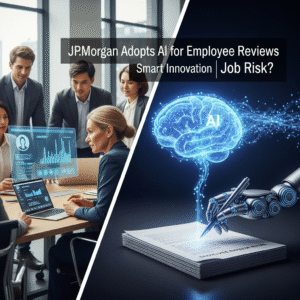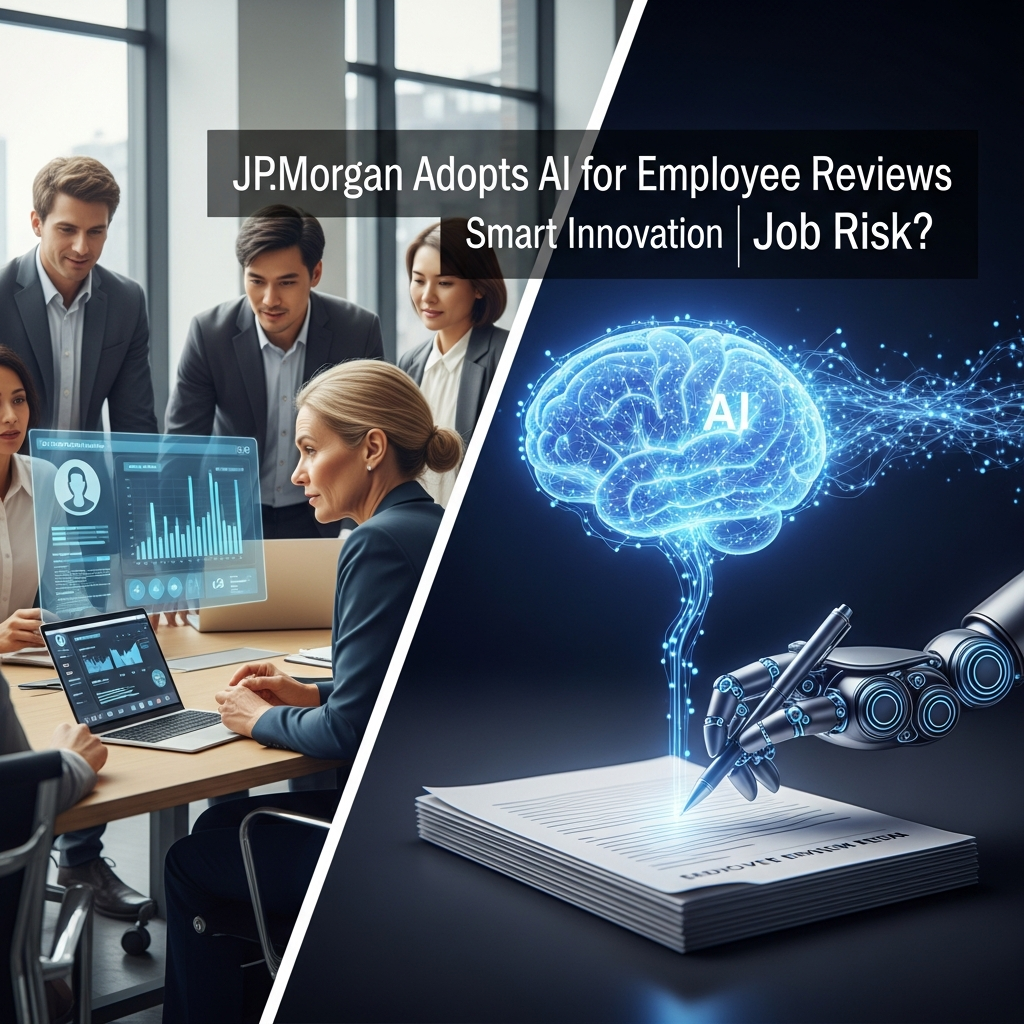What happens when America’s largest bank hands over one of HR’s most personal tasks to artificial intelligence? JPMorgan Chase has recently authorized its 300,000+ employees to use its proprietary AI system, LLM Suite, to help draft year-end performance reviews—a decision that’s sending shockwaves through the corporate world and raising critical questions about the future of work. Is this a brilliant efficiency move that could save managers countless hours, or are we witnessing the beginning of AI encroaching on uniquely human responsibilities? With 200,000 users already onboarded to the platform within just eight months of its launch, JPMorgan’s AI deployment represents one of Wall Street’s most extensive workplace AI integrations to date. As CEO Jamie Dimon stated, “It affects everything — risk, fraud, marketing, idea generation, customer service. And it’s the tip of the iceberg”, this technological shift forces us to confront uncomfortable truths about automation, workplace dynamics, and whether AI assistance represents innovation or a potential threat to job security and authentic human assessment.

The Technology Behind JPMorgan’s AI Performance Tool
What is LLM Suite?
JPMorgan’s LLM Suite is an in-house AI platform comparable to OpenAI’s ChatGPT, developed internally for security and compliance purposes. Unlike consumer AI tools that send data to external servers, this proprietary system keeps all information within JPMorgan’s secure infrastructure—a critical requirement for a financial institution handling sensitive employee and client data.
The platform operates through a simple yet powerful mechanism: employees enter prompts, and the system’s large language model generates a review draft based on those inputs. This allows users to specify key performance indicators, project accomplishments, areas for improvement, and development goals, receiving polished text in return.
How It’s Currently Being Used Across JPMorgan
The technology is already deployed across multiple departments: software engineers use it to review code, investment bankers leverage it to draft presentations, and legal teams employ it to examine contracts. The expansion into performance reviews represents the platform’s entrance into one of the most sensitive HR functions.
JPMorgan plans to invest $18 billion in technology in 2025, with approximately $2 billion annually dedicated specifically to AI initiatives. This massive financial commitment demonstrates the bank’s conviction that AI will fundamentally reshape how work gets done across every department.
The Efficiency Promise
The numbers tell a compelling story. According to Boston Consulting Group research, using AI to draft performance reviews reduces writing time by approximately 40%. For managers overseeing large teams, this translates to reclaiming dozens of hours during the hectic year-end review season.
What traditionally took an hour—drafting goals and objectives for the next year—could now be accomplished in just over 30 minutes. In an organization with over 300,000 employees, even modest time savings per review compound into enormous organizational efficiency gains.
The Boundaries: What AI Can and Cannot Do

Clear Limitations on AI Authority
JPMorgan has established firm guardrails around how the AI tool functions. The bank’s internal guidance explicitly states that AI-generated text should serve only as a starting point, with final responsibility resting with the employee submitting the review. This isn’t autopilot—it’s a co-pilot approach.
Most critically, the system cannot be used for compensation or promotion decisions. The AI assists with drafting the narrative portions of reviews, but human judgment remains supreme when actual career and financial outcomes are at stake.
Human Accountability Remains Central
JPMorgan emphasizes that employees remain ultimately responsible for final submitted reviews—meaning supervisors can’t simply copy and paste AI-generated text without review and refinement. This accountability framework theoretically prevents the depersonalization of feedback while still capturing efficiency benefits.
The question remains: Will managers treat AI drafts as mere starting points, or will time pressures and cognitive biases lead to rubber-stamping machine-generated assessments?
The Innovation Case: Why This Could Be Revolutionary
Democratizing Review Quality
One often-overlooked benefit involves equity in review quality. Not all managers possess strong writing skills, and communication ability shouldn’t determine whether employees receive thoughtful, well-articulated feedback. AI tools could democratize the review process, making it more accessible for junior supervisors who might lack strong writing skills, ultimately fostering a more equitable workplace.
An employee working under a manager who struggles with written communication might finally receive the same caliber of documented feedback as colleagues with more articulate supervisors. This could have significant implications for career development, particularly for employees in regions where English isn’t the primary language.
Reducing Unconscious Bias
Standardized AI-generated feedback may help minimize perceptions of favoritism or bias, an ongoing concern in performance evaluations. Human-written reviews often reflect unconscious biases around gender, race, age, and personality differences. Women frequently receive more personality-focused feedback while men get achievement-oriented assessments. Older workers may face coded language suggesting they’re not “adaptable” or “energetic.”
AI systems, when properly trained, could potentially strip away some of these biases by focusing on objective performance metrics and standardized language. However, this assumes the AI hasn’t inherited biases from its training data—a significant caveat we’ll explore later.
Freeing Managers for Meaningful Coaching
The administrative burden of performance reviews often overshadows their developmental purpose. Managers spend hours crafting written assessments when they could instead engage in substantive coaching conversations. By reducing writing time by up to 40%, AI assistance allows managers to focus on coaching and qualitative feedback.
Imagine a scenario where managers reclaim 10-15 hours during review season. Those hours could transform into additional one-on-one meetings, skills development planning, or career pathing discussions—activities that genuinely impact employee growth.
Consistency Across a Global Organization
For multinational organizations like JPMorgan, maintaining consistency in performance documentation across different countries, cultures, and management styles presents enormous challenges. AI-assisted reviews could establish baseline standards while still allowing customization for individual circumstances and local contexts.
The Risk Case: Why This Should Concern Us

The Authenticity Problem
If AI handles the bulk of writing, how do companies ensure that reviews reflect genuine managerial insight rather than algorithmic boilerplate? Performance reviews serve multiple purposes beyond evaluation—they document the employee-manager relationship, capture contextual nuances, and provide personalized development guidance.
When a manager uses AI to generate review language, whose voice emerges? Generic phrases like “meets expectations” or “demonstrates strong collaboration skills” might technically describe performance, but they lack the specific observations that make feedback meaningful and actionable.
Employees can typically distinguish between reviews written by someone who truly knows their work and those assembled from templates. AI-generated reviews risk falling into the latter category, undermining trust and engagement.
Data Privacy Concerns
Critics worry about data privacy, as employee information fed into the model could inadvertently expose sensitive details. While JPMorgan’s in-house system theoretically keeps data secure, questions remain about what information the AI retains, how it learns from inputs, and whether employee performance data could influence future algorithmic decisions beyond reviews.
Even with internal systems, there’s a difference between a manager’s private notes and information entered into an AI system that might be analyzed, aggregated, or used to train future models. Employees may not fully understand how their performance data is being processed and stored.
The Slippery Slope Toward Automation
Today, AI assists with drafting reviews. Tomorrow, could it assess performance directly? CEO Jamie Dimon has said AI is “going to change every job,” eliminating some roles and creating others. While JPMorgan explicitly prohibits using AI for compensation decisions now, technological capabilities and business pressures could gradually erode these boundaries.
Once organizations become comfortable with AI in sensitive HR functions, the temptation to expand its role grows. We’ve seen this pattern in other domains—customer service chatbots that started as supplements eventually replaced human agents for most interactions.
Reinforcing Existing Biases at Scale
AI systems trained on historical review data might actually amplify existing biases rather than eliminate them. If past reviews contained gendered language patterns, racial disparities in ratings, or age discrimination, an AI trained on that data will replicate and potentially magnify those patterns across thousands of reviews.
The technology doesn’t inherently create fairness—it depends entirely on training data quality, algorithmic design, and ongoing monitoring. Without rigorous bias testing and correction, AI tools could encode discriminatory patterns into a seemingly objective system.
Deskilling Managers and HR Professionals
Relying on AI for core managerial responsibilities risks atrophying critical human capabilities. Writing performance reviews requires reflection, empathy, and communication skills that managers develop through practice. If technology handles this cognitive work, managers may lose capacity for nuanced human assessment.
This “deskilling” phenomenon occurs across industries when automation removes opportunities to develop expertise. Doctors who rely too heavily on diagnostic AI may lose ability to reason through complex cases. Pilots dependent on autopilot systems sometimes struggle during manual flying emergencies. Could managers become similarly dependent on AI for employee assessment?
Over-Reliance and Abdication of Responsibility
Even with policies stating AI is merely a starting point, there are concerns about over-reliance on AI, which could lead to managers abdicating their responsibility for authentic, personalized feedback. Time-pressed managers might treat AI drafts as “good enough,” making only superficial edits.
The path of least resistance becomes accepting the AI’s output rather than engaging in the difficult cognitive work of truly evaluating performance and crafting meaningful feedback. This represents a form of moral hazard—the policy says managers remain responsible, but the technology enables avoidance of that responsibility.
What Employees and Managers Should Know
For Employees: Questions to Ask
If you’re working at an organization implementing AI-assisted reviews, consider asking:
About the Process:
- How extensively is AI being used to draft my review?
- Can I request a review written entirely by my manager without AI assistance?
- What data about my performance is being fed into the AI system?
About Data Privacy:
- How is my performance information stored and used?
- Who has access to data I discuss in reviews?
- Will AI-generated assessment data influence future algorithms or decisions?
About Fairness:
- How is the AI system tested for bias?
- What mechanisms exist to challenge potentially biased AI-generated assessments?
- How does the organization ensure consistency between AI-assisted and human-written reviews?
For Managers: Best Practices
If you’re using AI tools for performance reviews, maintain these principles:
Treat AI as a True Starting Point:
- Never submit AI-generated text without substantial personalization
- Use AI to overcome writer’s block, not to replace reflection
- Ensure your authentic voice and specific observations dominate the final review
Maintain Human Connection:
- Don’t let AI assistance replace face-to-face performance conversations
- Use time saved on writing for deeper coaching discussions
- Remember that employees value authentic feedback over polished prose
Protect Employee Trust:
- Be transparent about AI use in the review process
- Consider how employees might perceive AI-generated feedback
- Prioritize specificity and personal observation over generic descriptions
Monitor for Bias:
- Review AI outputs critically for potentially problematic language patterns
- Ensure reviews for women, minorities, and older workers receive equal detail and development focus
- Document specific accomplishments rather than personality assessments
The Broader Implications for the Future of Work
Financial Services Leading the AI Charge
JPMorgan’s move reflects competitive pressure in financial services, where firms including Goldman Sachs and HSBC are exploring ways to integrate large language models into operations. The banking industry, with its combination of massive data assets, regulatory sophistication, and technology budgets, serves as a proving ground for workplace AI applications.
Success or failure of JPMorgan’s initiative will influence decisions across industries. If the performance review tool demonstrably improves efficiency without negative impacts on employee experience, expect rapid adoption elsewhere. If it creates backlash or quality problems, organizations may proceed more cautiously.
Regulatory Questions on the Horizon
As AI systems influence increasingly sensitive employment decisions, this development could invite regulatory oversight. The Equal Employment Opportunity Commission (EEOC) in the United States has signaled growing interest in algorithmic employment practices. The European Union’s AI Act explicitly addresses AI in employment contexts.
Questions regulators might pursue include:
- How do companies ensure AI tools don’t perpetuate discrimination?
- What transparency obligations exist around AI use in performance management?
- Should employees have the right to human-only performance reviews?
- How should AI-assisted reviews be disclosed in legal proceedings?
The Changing Nature of Management
This development accelerates a fundamental question: What is management in an AI-augmented workplace? If AI can draft performance reviews, generate development plans, and analyze productivity patterns, what uniquely human contributions remain?
The answer likely involves emotional intelligence, complex judgment, ethical reasoning, relationship building, and strategic thinking—capabilities that AI struggles to replicate. But organizations must intentionally preserve space for these human capabilities rather than allowing technology to colonize every management function.
Alternative Approaches Organizations Should Consider
Human-Centered AI Implementation
Rather than AI drafting reviews, consider AI as an analytical assistant that:
- Identifies performance patterns from objective data
- Suggests relevant examples from project records and communications
- Flags potential bias in human-written drafts
- Provides writing quality feedback without generating content
This approach maintains human authorship while leveraging AI’s analytical strengths.
Redesigning Performance Management Entirely
Instead of using AI to perpetuate potentially flawed performance review processes, organizations could reimagine performance management:
- Shift to continuous feedback models rather than annual reviews
- Focus on developmental conversations instead of evaluative documentation
- Implement peer feedback systems alongside managerial assessment
- Use AI for skills gap analysis and learning recommendations rather than review writing
Collaborative Writing Models
Some organizations experiment with collaborative review writing where employees draft self-assessments, managers add observations, and peer feedback is integrated—all before AI assists with organizing and refining the combined input. This ensures authentic human perspective dominates while AI handles mechanical editing.
Expert Perspectives and Industry Reactions
Raj Abrol, CEO of AI firm Galytix, noted that the announcement demonstrates how financial institutions are accelerating AI adoption—but warned that trust remains a key barrier. Trust isn’t just technical—it’s relational. Employees must trust that AI-assisted reviews still reflect genuine managerial attention and understanding.
Industry analysts observe that JPMorgan’s measured approach—keeping AI out of compensation decisions and emphasizing human accountability—may represent a template for responsible AI deployment in sensitive HR functions. However, maintaining these boundaries requires organizational discipline when efficiency pressures mount.
Labor experts express concern that efficiency gains often translate to reduced headcount rather than enhanced work quality. If AI enables each manager to oversee larger teams by streamlining administrative tasks, organizations might reduce management positions rather than improving the depth of employee support.
Conclusion
JPMorgan’s adoption of AI for performance review assistance represents a pivotal moment in workplace technology evolution. The initiative offers genuine benefits—time savings, potential bias reduction, writing assistance for less articulate managers, and consistency across a massive global organization. Yet it also introduces legitimate concerns about authenticity, privacy, over-reliance, and the gradual erosion of uniquely human management capabilities. Whether this proves to be less about replacement and more about rewriting how work gets done depends entirely on implementation choices, organizational culture, and steadfast commitment to keeping humans central in human resources.
The question isn’t whether AI will transform performance management—it already is. The question is whether we shape that transformation thoughtfully or allow efficiency imperatives to override human considerations. As this technology spreads beyond JPMorgan to companies across industries, employees, managers, and HR leaders must engage critically with these tools, establishing norms that harness AI’s capabilities while preserving the irreplaceable human elements of feedback, growth, and meaningful work relationships.
What’s your take? Does AI-assisted performance review writing represent progress or peril? Share your thoughts and experiences in the comments below. If you’re navigating AI in your workplace, subscribe to stay informed about emerging best practices and critical developments in the future of work.
FAQs
Q: Is JPMorgan forcing employees to use AI for performance reviews?
A: No. The system isn’t mandatory—it’s an optional tool that employees can choose to use or ignore. Managers and employees can still write reviews entirely manually if they prefer. This voluntary approach helps test adoption and acceptance before considering broader mandates.
Q: Will AI-written reviews affect my salary or promotion decisions?
A: JPMorgan has explicitly stated that the AI tool cannot be used for compensation or promotion decisions. The system assists only with drafting the narrative portions of reviews. Actual decisions about raises, bonuses, and career advancement remain firmly in human hands, based on manager judgment and organizational processes.
Q: How does JPMorgan’s AI system ensure data privacy and security?
A: The platform was developed in-house specifically to provide secure access to AI capabilities while protecting client and regulatory data. Unlike consumer AI tools that send data to external servers, JPMorgan’s LLM Suite keeps all information within the bank’s secure infrastructure, subject to the same rigorous security standards as other sensitive banking systems.
Q: Could this AI eventually replace HR professionals or managers?
A: CEO Jamie Dimon has acknowledged that AI is “going to change every job,” eliminating some roles and creating others. However, the current implementation focuses on augmenting human capabilities rather than replacing them. The greater risk involves deskilling—where managers lose capacity for nuanced assessment—rather than immediate job elimination. Long-term impacts depend on how organizations choose to deploy increasingly capable AI systems.
Q: How can I tell if my manager is just copying AI-generated reviews?
A: AI-generated reviews often contain generic language, lack specific examples unique to your work, use similar phrasing across different sections, and feel impersonal. Authentic reviews include detailed observations about particular projects, specific conversations or moments, contextual understanding of challenges you faced, and personalized development suggestions aligned with your individual career goals. If your review feels template-like or could apply to anyone in your role, it may rely heavily on AI without sufficient customization.
Q: Are other companies besides JPMorgan using AI for performance reviews?
A: Other financial firms including Goldman Sachs and HSBC are exploring ways to integrate large language models into operations. Start-ups like Mosaic and Rogo are developing tools tailored specifically to financial services tasks. Across industries, various HR technology platforms now offer AI-assisted writing features for performance management, though JPMorgan’s deployment represents one of the most extensive implementations to date.
Q: What should I do if I’m uncomfortable with AI being used in my performance review?
A: Start by understanding your organization’s specific policies—whether AI use is mandatory or optional, what data is collected, and how final decisions are made. Express concerns to your HR department or manager about wanting authentic, personalized feedback. Document your request for human-written reviews if that’s important to you. In some jurisdictions, employees may have legal rights regarding automated decision-making in employment contexts. Consider whether this issue represents a broader organizational culture concern worth addressing through appropriate channels.
Q: Does AI in performance reviews introduce new bias, or does it reduce existing bias?
A: The answer is complex and depends on implementation. AI could potentially reduce bias by standardizing language and focusing on objective performance indicators rather than personality traits or subjective impressions. However, if AI is trained on historical review data containing gendered language patterns, racial disparities, or age discrimination, it may replicate and amplify those patterns. Effective bias reduction requires careful training data curation, ongoing algorithmic monitoring, and regular audits of AI outputs for problematic patterns—not simply deploying the technology and assuming fairness results.

